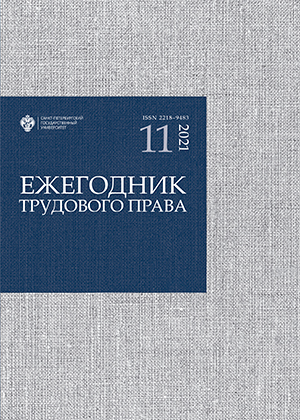Some results of the development of the National qualifications system in the Russian Federation
Abstract
The qualification of an employee plays a key role in the economic development of any state. Russia uses international experience in creating a National qualification system that would address the shortage of highly qualified personnel, create a system of continuing education and improve professional skills, and, most importantly, create tools for evaluating employee qualifications. At present, after eight years after the introduction of the concept of “professional standard” in the Russian Labor code, we can talk about certain results and problems that have arisen. Using a comparative legal analysis of the legislation, the author achieved the following research results. There are gaps in the conceptual framework, namely, the absence of the concept of a national qualification system, the uncertainty of its constituent elements, the lack of a legally fixed definition of the national qualifications framework, and there are still disputes about the concept of “employee qualification” and “professional standard”. Almost methodical work is not carried out, it is fragmented and contradictory, despite the creation of a whole system of bodies and organizations that ensure the functioning of the National qualifications system. The study allowed the author to conclude that the professional community, which should play a leading role in the work of professional qualifications councils and the creation of professional standards, takes a passive position. Employers explain this by the complexity of administrative procedures and lack of resources. Previously adopted professional standards are canceled after a fairly short time, which creates instability in labor relations, forcing employers to review their local regulations. The unresolved methodological and organizational issues allow us to state that the main problem of the current state of the process of implementing professional standards is the lack of readiness of the labor market for a real transition to these standards and their use as a universal tool for assessing the level of qualification of employees in a dichotomy, when professional standards are mandatory for some subjects, and The study also concluded that an independent assessment of qualifications is not available for the entire range of types of work. A critical assessment of the possibility of passing a professional exam without the lack of basic professional education is given.
Keywords:
national qualifications system, national qualifications framework, employee qualification, professional standard
Downloads
References
References
Downloads
Published
How to Cite
Issue
Section
License
Articles of "Russian Journal of Labour & Law" are open access distributed under the terms of the License Agreement with Saint Petersburg State University, which permits to the authors unrestricted distribution and self-archiving free of charge.




